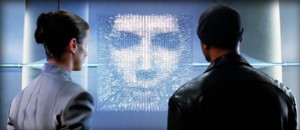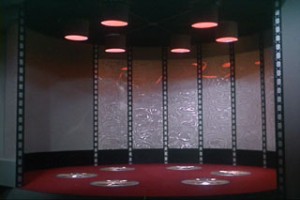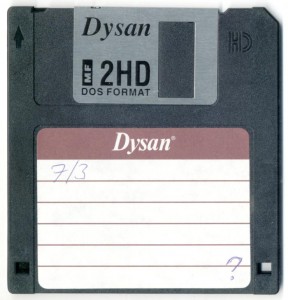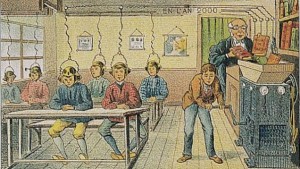Good sci-fi is often a metaphor for something in our lives. Star Trek was dealing with a future where we came out of the other side of the civil rights movement and the cold war intact and better for it. George Orwell made a police state so convincing that the modern day governments apparently took it as a how-to manual. Philip K Dick often wrote about worlds where people were often convicted before they had done any wrong and where your identity was up for question – after one hell of a drug problem left a mark on him (seriously, A Scanner Darkly was based on his drug trips).
But writing good sci-fi isn’t just about having a metaphor in mind. There’s often a lot of great work that is based simply on an idea with great characters. Conversely, there’s a lot of stuff with a philosophy behind it that falls short of the mark because the actual sci-fi portion of it is so poorly handled. It’s the ones that find a balance between the fantastic and the relatable that endure for years to come.
This is particularly noticeable in writing the future or near future. When writing about something that’s rooted more in theoretical science it’s easy for that work to shift to just simple fantasy over time. The first true “Science Fiction” Novel ever was Frankenstein, but the casual observer today would sit it in the same category as Dracula and other fantasy stories. But when something is working on an idea of the future and sticking to the mundane, it becomes a lot harder to find a place for it. We couldn’t very well call some ideas we had in the past “fantasy”, but it’s hard to ignore how outrageous it now seems in hindsight.
So how do you walk that line? How do you make your portrait of the future something that can withstand that test of time?
5 Tips For Futuristic Worlds
The future is an intangible object to us in the modern day. We have our hopes and our dreams, but to actually craft an image of it requires a lot of guess work and imagining the work of people we have to admit are smarter than we are. Even Asimov’s stories on robots were purely guess work and I’d argue that his three laws are a bit too flawed for us to really put into practical application. After all, the zeroth law exists for a reason and it’s actually a lot more likely to evolve from the first law than we’d like to admit.

So the thing we have to understand the most when writing the future is that, eventually, we’re going to be called on what we wrote and our work will be reclassified as time passes us by. My personal work includes just enough fantasy in the mix that when the time passes it’ll be reclassified as an alternate universe or fantasy piece. But not everyone wants to go that direction. Some people want to have their work taken seriously for the remainder of time and that requires approaching that future in a careful fashion.
First, we have to accept something before we can move on…
Some Ideas Are Timeless
One of the first major mistakes of future building is the idea that the future is going to be so dissimilar to what we have today that we’re not going to have any of the same technologies lying around. One example of this would be if a world turned exclusively towards 3D holographic displays rather than monitors. In theory these holograms are superior because they show information in a fashion that’s more detailed and closer to our natural state than the information you’d find on a flat screen.
But for this to be entirely true we’d have to discount the benefits that a monitor can have over a hologram. First, the hologram is likely to require more power to operate just by nature. Even if you make it as efficient as possible, the projection is going to be more complicated and thus require more parts and energy to run those parts. If you’re trying to build a large scale operation, having nothing but holograms around may not be as practical as having monitors alone or a combination of both. So it’s reasonable to say that holograms wouldn’t naturally supplant the old technology but rather complement it by filling a niche of its own.
The same can be said for many technologies we have today. If you have teleportation technology, you wouldn’t necessarily get rid of all physical transports. There could be problems with signal transmission, payload, or limitation in use. You can’t necessarily explore via teleportation, given the instantaneous nature of it combined with the need to know where you’re going before you actually go there. A ship, while considerably slower, would let you make changes along the way, go directions you weren’t intending to go, and examine things as you travel. And, once you reach a destination, if there’s no actual physical ground to stand on, a ship has a deck while a transporter does not.

You can apply this to just about everything that’s practical and come to the conclusion that most ideas that are solid and serve a purpose will still be here later until all of their purposes have been eliminated. Personal transports, communication devices, information technologies, these will all still be present in some form in the future. So, considering that, also keep in mind to…
Never Forget Progress
It’s absolutely true that some ideas will be around forever, but those ideas don’t necessarily stagnate. The phone, for instance, is here to stay so long as civilization doesn’t collapse. We need to communicate with other people across vast distances and that requires two people be able to pick something up to do it with. However, the phone didn’t stay as a thing hooked to our wall and over time there was a gradual evolution from a stationary object to one we could take with us when we travel. This was a natural progression of ideas that added features to an old idea until it was more functional as a result.
Taking an example from the last point: perhaps the monitors can project the holograms when necessary so you have a single unit to do two jobs. The holograms would be there for necessary uses such as modeling something in 3 dimensions, but the monitor would still be there to be used for more simple tasks with less energy consumption. Similarly, if the monitor in question were the screen of a smartphone, you’ve effectively combined three technologies to create a superior design to any of the three alone.
Similarly, personal transports have been updating for some time and will continue to do so from here on out. Self-driving cars are becoming a reality in our lifetimes (with Google’s car even avoiding accidents until a human touched the wheel). Engines have become more efficient over time as well, able to run longer on less fuel and some even cut the fuel out of the equation in favor of energy storage via large batteries. Eventually, these ideas will come together with other ideas to create something we’ve known would eventually be coming for a long time: self-driving electric cars which respond to your commands. It’s a futuristic idea, but one we’re going towards.
So, when creating your future world, remember those changes and consider how you feel the world is going to progress. We currently carry our phones in our pockets, but it’s starting to become a situation we carry them on our wrists or our face. Is this the direction we’re going? No clue. But it wouldn’t be out of the question for you to make an argument that’s where we end up.
Just remember, as you’re making that argument…
Good Ideas Serve A Purpose
Before deciding on how your world is going to progress, don’t forget to take a moment to ask yourself, “why?”
It’s a question a lot of writers fail to ask themselves and it’s really one of the most important questions you could ever ask. Why is my character doing what they’re doing? Why is this the way the world is? Why is my protagonist talking into a shoe?
It’s not enough to introduce concepts to your world and hope they stick. You have to know why those concepts exist in your world and you have to make sure they make sense. If you’re going to say that everyone’s eating some sort of paste in the future instead of solid food, be damn sure you explain why. Is there a shortage of conventional foods? Has the world decided that old agriculture methods were unsustainable? Is the human race overpopulating? There are plenty of reasons for this to be a factor, just don’t assume that these reasons are a given. If something is dramatically different in your world, make sure that change has a good reason behind it.
In my personal works I point out that a great deal of technology is now powered by solar. It’s obviously a cleaner form of energy than anything we’ve currently got going, but it also comes with the explanation that the Alter race has been studying solar energy for a lot longer than the rest of us have, so they brought with them more efficient solar tech. If I’d simply slapped in “everything’s solar powered because I say so” it would seem oddly out of place given it has little to do with anything else in the story. But, by tying it into the backstory of the world, not only do I give explanation for the dominance of the technology but insight into part of how the world got to where it is.
So not only does providing these explanations help solidify your future but also connect the dots from our today to your tomorrow. And that also requires you to…
Know Your Current Events
One thing to be clear about when you’re building this world is to be up to date on where everything is today. If a technology is about to be rendered obsolete in the next couple of years, it won’t still be around in your future world. One great example of this is how many past representations of the future featured computers that still operated on punch-cards when magnetic information storage was being researched at the time. With some research into what the science world was actually working on at the time, maybe they would have avoided that particular mistake in their projections.

You don’t have to be an expert on these subjects, just up to date enough to make a guess on how long it’s going to take before a certain technology is going to be a major part of every day life. Cybernetics may be common place within a generation, but not so prevalent that everyone in the world is augmented with them. Computers will be immensely powerful in 20 years, but not likely to be completely sentient on their own (yet). It’s little points of keeping track of where we are today so you can make a guess about tomorrow.
If you’re thinking that a technology you want to use isn’t going to be completed in the next few decades, push your story further down the timeline or even make an effort to get an idea on how far along that technology might be in your era. A good example of this would be Deus Ex: Human Revolution, which featured advanced cyborg technology but also pointed out that the interface between the organic and inorganic parts was problematic for most users. It’s a minor detail that makes little difference to the protagonist, but helps flesh out the world and demonstrates a missing link between our modern day and the world featured in the stories further down the line.
But, whatever you decide to do with what you learn, the most important lesson is probably…
Commit To Your Direction
In the end, the biggest thing is to commit to your direction. If you’re going to try to make it as hardline realistic as possible, keep true to what you know and don’t worry about what you don’t. Don’t make guesses to try to cover your ass if you’re not sure on it, just stick to what you are sure of. And if you don’t think you can make it realistic with what you know, don’t try, just adjust to make it understandable.
What does that mean? Well, if you’re going to have technology that’s borderline magic, throw it as far into the future as you feel that would happen. The technological singularity is a thing that we watch for because we know there will be a point in our future where nothing is recognizable anymore. If you feel like you can’t make your future recognizable and realistic feeling while doing the story you want to do, use the technological singularity, go all out and swing for as far out as you want.
I know this seems counter to the rest of the points listed here, but the most common failing of speculative fiction is a writer who lacks confidence in what they’re doing and are doing what they’ve seen elsewhere as a result. When you don’t feel brave enough to make your own decisions, it’ll feel either hollow or like a pale shadow of a better work. When you’re willing to make your own decisions and carve your own path, you’ll find the results are better for it.
What this really means is just try not to worry too much about how accurate your depiction really is. You wouldn’t be the first person to miss the mark, and entire cultures missed the mark for a long time coming. For every Jules Verne out there that predicted things like landing on the moon, there were just as many people who thought this…
Was what the year 2000 would look like.
(I write novels and tweets, both of which the people in the past didn’t see coming until they were here.)














